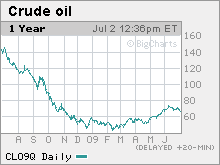Oil hits 6-week low
Crude prices fall to $64 a barrel as rising unemployment calls into question the likelihood of an economic recovery.
NEW YORK�(Reuters) -- Oil fell more than 4% to $64 a barrel Monday as doubts over a potential rebound in the global economy spurred investor risk aversion.
U.S. crude traded down $2.68 from Thursday's close to settle at $64.05 a barrel Monday. U.S. markets were closed Friday for the Independence Day holiday weekend.
That's the lowest settle price since May 27, when crude ended at $63.45.
Optimism that an economic recovery could bolster demand has helped lift crude off December lows below $33 a barrel. Recent weak economic data -- including a poor U.S. jobs report last week -- has weighed on markets, however.
U.S. stock markets dipped, despite data showing the U.S. service sector contracted at a decelerating pace last month, with activity at the highest since September 2008.
"A lot of people are nervous about the economy and now, everybody wants to get out of the exits at the same time," said Phil Flynn, PFGBest Research, Chicago.
"We are seeing this in the stock markets, the gold market and markets for other commodities, including oil. We did get a little bit of support in the latest ISM (service sector) numbers, but all in all, I feel that demand will be on a downward trend in the next couple of months," Flynn added.
The yen and the U.S. dollar gained broadly as investors shunned risk and bought currencies perceived to be safe, adding pressure to commodities denominated in greenback.
The Reuters-Jefferies CRB index, a global commodities benchmark, gave up about 1.75% by the early afternoon.
Crude has also found some support due to attacks on oil installations in OPEC member Nigeria.
Nigeria's main militant group said on Monday it had sabotaged a Chevron (CVX, Fortune 500) oil facility and seized a chemical tanker and six crew members, the latest in a string of disruptions to output from Africa's biggest energy producer.
France and Britain called for action to curtail oil price volatility as part of a move towards tougher global governance to prevent a return to economic problems that existed before the financial crisis.
Crude prices hit a record $147 a barrel last July before crashing to $32.40 a barrel in December, as the economic crisis battered global fuel demand. ![]()


